You might be wondering what the highest possible IQ is. There is no universal definition of intelligence, and the concept is highly subjective.
What we typically consider a high intelligence quotient might not be considered high by someone else. That’s why it’s hard to develop a single number that accurately reflects the highest possible IQ.
But that doesn’t mean that there isn’t any evidence to suggest that the average IQ of humans likely clocks in around 125 – 130 (which places us squarely within the ‘gifted’ range).
But what exactly does it mean to have a high intelligence quotient? And why would someone need one? Find out more in this article.
What is Intelligence Quotient (IQ)?
There is no single definition of intelligence, but consensus suggests that an IQ score reflects a person’s ability to think abstractly, solve problems, and make decisions.
The definition of intelligence quotient (IQ) can be disputed, but it is generally agreed to measure a person’s intellectual ability.
Many experts believe an intelligence quotient score is one measure of overall intellect and shouldn’t be limited to those who achieve success in traditional academic settings.
Some people believe that IQ results from a person’s genes; others believe it results from their environment and experiences.
What does an IQ test measure?
The IQ test measures your ability to reason, solve problems, and think abstractly. These are all essential skills for success in life.
IQ tests are popular tools educators and employers use to measure someone’s intelligence.
They can also be helpful for parents seeking to find gifted children and people trying to improve their intelligence quotient. The following generalized IQ score range and meaning.
- 130 and above – Very gifted (about 2.1% of the population falls within this category)
- 121-130 – Gifted (about 6.4% of the population falls within this category)
- 111-120 – Above average intelligence (about 15.7% of the population falls within this category)
- 90-110 – Average intelligence (about 51.6% of the population falls within this category)
- 80-89 – Below average intelligence (about 15.7% of the population falls within this category)
- 70-79 – Cognitively impaired (about 6.4% of the population falls within this category)
IQ tests help you understand how you process information and why you think the way you do. This is important not just for people who want to get ahead in life but for everyone.
It’s one thing to be smart in school; it’s another thing to think on your feet and come up with solutions when you’re faced with a problem.
What are the applications of an IQ test?

1. Evaluation of cognitive abilities of an individual
Assessing an individual’s intelligence is essential for evaluating their skills in a specific area and identifying any potential issues with cognitive abilities.
For example, if an individual has difficulty remembering information or concentrating, this could indicate a problem with their intelligence quotient.
On the other hand, if an individual has a high IQ but struggles to apply it in daily life, this could be a sign that they would benefit from additional resources and support.
IQ tests give you a snapshot of your cognitive ability at that given moment.
2. Assessing a person’s eligibility for a job
An IQ test is a valuable tool that can help employers assess a person’s eligibility for a job.
Many people are surprised to learn that an IQ test is not just a measure of intelligence. It also assesses a person’s ability to think logically, solve problems and read and write well.
This test varies in difficulty, but most of them have a standard range that most people fall within.
This information can help employers decide whether a person is ready for a new job or needs additional training.
3. Educational assessment
Educational assessment is one of the many applications of the intelligence test.
IQ tests can help us identify students who might benefit the most from special education, gifted programs, and other forms of customized instruction.
The test can also be used to find students with intellectual disabilities. The tests are reliable and valid tools, and they can help educators identify students who need extra support.
4. Diagnosis of intellectual disabilities
Intellectual disabilities (ID) are a group of conditions that affect intelligence.
ID is not just a mental disorder – it’s a real, physical disorder that can impact a person’s daily ability to learn and function. No one test can accurately diagnose intellectual disabilities.
Although an IQ test cannot predict one’s future academic or vocational success, it can provide important information on one’s level of intelligence.
By understanding a person’s intelligence quotient score, families and educators can better plan for their child’s future and help them reach their full potential.
5. Psychological research purposes
IQ tests have been used for many years to measure a person’s intelligence, and today they are often used in psychological research.
The tests are commonly used to study differences between different groups of people.
These tests also help determine how intelligence relates to other critical psychological characteristics and test the effects of different educational interventions.
For example, high IQs are often associated with success in math and science. And that’s because high IQs allow people to think critically and solve problems quickly.
What is the highest possible IQ?
IQ scores are debated, but over 120 are generally considered high. Below is a list of some of the highest-recorded IQs over time.
- William James Sidis (250 to 300)
- Ainan Celeste Cawley (263)
- Marilyn Vos Savant (228)
- Terence Tao (around 225 to 230)
- Christopher Hirata (225)
- Kim Ung-Yong (210)
- Edith Stern (200)
- Christopher Michael Langan (around 190 to 210)
- Garry Kasparov (194)
- Philip Emeagwali (190)
- Judit Polgar (170)
- Albert Einstein (around 160 to190)
- Stephen Hawking (160)
A high intelligence quotient will likely improve problem-solving, creativity, and critical thinking. These skills are essential for success in any field.
A high IQ also allows people to think more profoundly and rapidly than others, leading to creativity and new ideas.
What steps can you take to increase your IQ?
There is no one-size-fits-all approach to increasing your IQ, but there are a few key steps you can take:
- Start by reading extensively
- Focus on problem-solving skills and learning new knowledge
- Practice meditation or cognitive behavioral therapy
- Eat a healthy diet and exercise regularly
- Attend social events that stimulate intellectual dialogue
- Develop a strong working memory and practice chunking information
Is an IQ level an accurate measure of intelligence?
There is much debate about the accurate measure of intelligence, but there is one thing that is clear: an IQ level is not the only indicator of intelligence.
Intelligence is not simply a product of our IQ level. Our IQ level is just one measure of the many abilities and qualities that make up intelligence.
Everyone has different strengths and weaknesses that vary from person to person. Besides, countless factors can contribute to someone’s ability to think, learn, and solve problems.
For example, some people believe that creativity is a significant aspect of intelligence and that measuring creativity with an IQ test might not be the most accurate way to measure it.
Other people believe that self-awareness is a key component of intelligence and that assessing this ability with an IQ test might be more accurate than measuring creativity.
There is still much we don’t know about intelligence, and no single measure is universally accepted as being the best way to gauge it.
Finally, whether an IQ level truly determines a person’s intelligence is a question that remains unanswered but should not be ignored.
FAQs
What is a good IQ score?
The ideal IQ score for someone is still debated, but an IQ over 120 is generally considered above average.
What are the differences between aptitude tests and IQ tests?
There are a few key differences between aptitude tests and IQ tests.
IQ tests are designed to measure intelligence in general, while aptitude tests are designed to measure specific skills and abilities.
What factors influence a person’s IQ?
Some factors influencing a person’s IQ include:
- Age
- Genetic factors
- Cultural practices and beliefs
- Early childhood development
- Environment
- Educational background
Final thoughts
On the surface, it might seem that having a high IQ is a prerequisite for a successful career. After all, successful individuals are typically smart people, right?
But this isn’t always the case. In fact, some of the most successful and influential people in history didn’t have the highest IQs.
Instead, they relied on their intuition, creative thinking, and other abilities not traditionally seen as indicative of intelligence.
So don’t let your IQ define you – use it to reach your goals, but don’t overestimate its importance.
It is said that the world is in an information age. Thus, there’s a need for people to learn fast and smart. For more information, read the article that highlights smart learning.
Thanks for reading.







